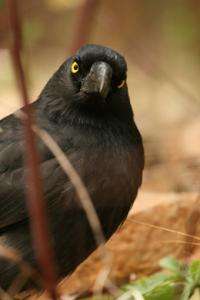Noisy youngsters pay the ultimate price

(PhysOrg.com) -- Babies crying with hunger may attract annoyed looks from bystanders, but in the bird world noisily crying nestlings are likely to pay the ultimate price, according to the authors of a new study from The Australian National University.
The study, conducted by PhD researcher Tonya Haff and Professor Robert Magrath of the Research School of Biology at ANU, shows that in the bird world nestlings who noisily beg for food will attract predators.
Additionally, it could explain why young birds are honest about their food needs: if calling wasn’t risky, then nestlings would simply exaggerate their hunger to get more food. The researchers’ paper is published in Biology Letters.
The research was conducted on white-browed scrubwrens in the Australian National Botanic Gardens. By playing recordings of the sound of hungry youngsters at more than 90 nests, the researchers have revealed for the first time that noisy hunger can be fatal.
“By playing back hungry nestling calls at active nests of scrubwens we found that predators – in the Botanic Gardens that means Pied Currawongs – only approached nests playing calls of hungry nestlings, and not those where the young called more modestly,” said Ms Haff.
“So loud begging does attract predators, making begging worthwhile only when the young are really hungry. It’s further proof that there really is no such thing as a free lunch. ”
Ms Haff said that the research also potentially sheds light on why nestlings are honest in their requirements for food.
“Nestlings want as much food as they can eat to help them grow and be strong once they leave the nest, but parents tend to provide a bit less. The question, then, is why don’t nestlings just keep begging more and more loudly so that their parents give them more food? In fact, we know that nestlings tend to beg below their maximum potential call rate or call amplitude, and escalate calling only when they are really hungry. Thus, begging seems to be an ‘honest’ signal.”
She added that the research offered new opportunities for researchers to understand the forces behind signal honesty such as the tradeoffs between being fed and the risk of predation.
More information: Reference: rsbl.royalsocietypublishing.or … 010.1125.short?rss=1
Provided by Australian National University


















